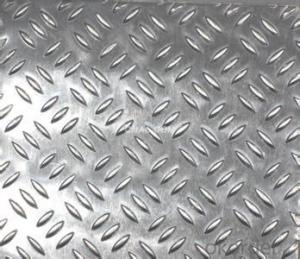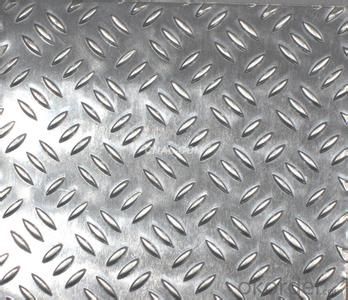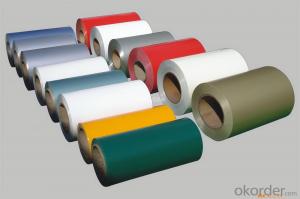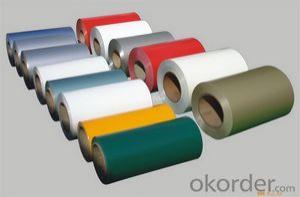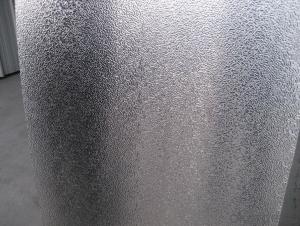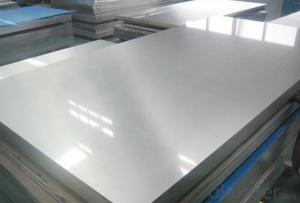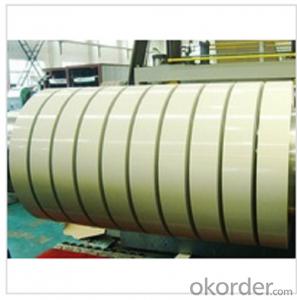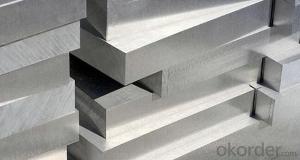3003 Aluminum Coil Price - Aluminium Checkered Sheet-Three Bars
- Loading Port:
- China Main Port
- Payment Terms:
- TT OR LC
- Min Order Qty:
- -
- Supply Capability:
- -
OKorder Service Pledge
OKorder Financial Service
You Might Also Like
Product Description:
1. Specifications of Aluminum Checkered Sheet
| MAIN SPECIFICATION OF ALUMINUM CHECKERED SHEET | |
| Alloy | AA1XXX (AA1050, AA1060, AA1070, AA1100 etc.) |
| AA3XXX (AA3003, AA3004, AA3005, AA3105 etc.) | |
| AA5XXX(AA5052) | |
| | |
| Temper | H14,H18,H24, H26, H32 |
| Thickness | 0.2mm-100mm |
| Width | 30mm-1700mm |
| Standard | GB/T 3880-2006 |
| Special specification is available on customer's requirement | |
2. Usage/Applications of Aluminum Checkered Sheet
The embossed aluminum sheet are widely used for decorative purposes in construction, packing and appliance. It is also very commonly used for anti-splippery purposes in vehicles and public places.
3. Packing & Delivery of Aluminum Checkered Sheet
Packaging: Seaworth package
Shipment: The goods will be delivered in not more than 40 days after getting the buyer's payment.
- Q: How much of a difference does it make? I recently bought a 700 SPS tactical in 308. It has the Houge pillar bedding stock. I love the tacky feeling rubber outside, but noticed that the fore end of the stock flexes a bit (enough to touch the free floating barrel.) I was wondering if the aluminum bedding block version of the same stock (or any other aluminum bedding stock) will be better? I know they cost more, and the experts claim they're great, but will an amateur shooter notice the difference? I like to target shoot, typically around 200 yards. BTW, I was also considering the Bell and Carlson medalist.
- The flex around the barrel is OK. The pillar bedding and aluminum bedding both perform the same functions, it's just the aluminum frames spread the support out more broadly. These changes came about with the Bean Field rifles, Kenny Jarrett and others trying to get best accuracy. The floating barrel and the composite stock are of the same ideas. To get to the next level of accuracy you should start hand loading for your rifle. If you don't want to do it you can usually find someone who might do it for you if you buy the components and the proper die if needed. I have a Browning A-Bolt that will shoot well with factory stuff, but with my reloads I get 5 shot groups I can cover with a quarter, and that is just off a sandbag not a supported bench rig. If you need better accuracy than even that you really need to put money out for truing and facing the bolt, truing the action, etc. So, I'm thinking you have a very good stock now, changing it isn't going to gain you much, but looking at loading and truing would make more impact, especially the loading and adjusting the Cartridge Overall Length to match your specific rifle.
- Q: Can aluminum coils be used for electrical transmission lines?
- Yes, aluminum coils can be and are commonly used for electrical transmission lines. Aluminum has several advantages that make it a suitable choice for transmission lines. First, aluminum is a lightweight material, which makes it easier and more cost-effective to transport and install. Second, aluminum is a good conductor of electricity, with similar conductivity to copper. Third, aluminum is less expensive than copper, making it a more economical option for long-distance transmission lines. However, there are some challenges associated with using aluminum coils in transmission lines. Aluminum has a lower tensile strength compared to copper, which means that it is more prone to sagging over long distances. Additionally, aluminum has a higher thermal expansion coefficient than copper, which can cause issues with thermal expansion and contraction. Despite these challenges, proper design and engineering can ensure that aluminum coils are used effectively and efficiently in electrical transmission lines.
- Q: What is an aluminum coil and what is it used for?
- An aluminum coil, shaped like a rolled-up sheet of aluminum, is made from high-quality aluminum alloys known for their durability, lightweight nature, and resistance to corrosion. Aluminum coils are widely used in various industries, particularly in the manufacturing sector where they are utilized to create aluminum products like cans, containers, and packaging materials. The flexibility and malleability of aluminum coils allow them to be easily shaped into different sizes and forms. Moreover, the construction industry extensively relies on aluminum coils for multiple purposes. These coils are commonly employed in roofing, siding, gutters, and other exterior applications due to their ability to withstand harsh weather conditions and resist corrosion. Their lightweight nature also simplifies handling and installation, reducing labor and transportation expenses. Furthermore, aluminum coils play a crucial role in heating, ventilation, and air conditioning (HVAC) systems. They are integral components in the production of condenser and evaporator coils, which are essential for regulating temperature and humidity in residential, commercial, and industrial buildings. To summarize, aluminum coils are highly versatile and valuable materials that have widespread applications in numerous industries. Their lightweight nature, resistance to corrosion, and malleability make them an excellent choice for manufacturing aluminum products, as well as for construction and HVAC applications.
- Q: How do aluminum coils compare to other metals in terms of strength?
- Aluminum coils generally have lower strength compared to other metals such as steel or titanium. While aluminum is lightweight and offers good corrosion resistance, it may not possess the same level of strength and durability as some other metals. However, the specific strength of aluminum coils can vary depending on the alloy composition and manufacturing process.
- Q: What are the compositions of aluminum coil coating?
- Resin, pigment, auxiliary and solvent.
- Q: Can aluminum coils be used in the manufacturing of beverage cans?
- Yes, aluminum coils can be used in the manufacturing of beverage cans. Aluminum is a commonly used material for manufacturing beverage cans due to its various advantages. Aluminum coils are typically rolled into thin sheets, which are then cut, formed, and coated to create the final can shape. These coils provide a lightweight, durable, and corrosion-resistant material that is suitable for storing and preserving beverages. Additionally, aluminum is a highly recyclable material, making it an environmentally friendly choice for beverage can production.
- Q: Can aluminum coils be insulated?
- Indeed, insulation can be applied to aluminum coils. It is a widespread practice to enhance energy efficiency and avoid heat loss or gain. Usually, the insulation material envelops the aluminum coil, creating a safeguarding coating that minimizes thermal transfer. This insulation method contributes to preserving the desired temperature within the coil and averting detrimental condensation. Moreover, insulation additionally enhances the overall functionality and durability of the aluminum coil system.
- Q: This question seeks advice on methods to prevent rust formation on aluminum coils.
- <p>To prevent rust on aluminum coil, ensure proper storage conditions by keeping the coils dry and avoiding contact with moisture. Use protective coatings or sealants that are compatible with aluminum to create a barrier against the elements. Regularly inspect the coils for signs of corrosion and clean them with a non-abrasive cleaner to remove any contaminants. Avoid using harsh chemicals that could accelerate oxidation. Maintain good ventilation in storage areas to reduce humidity, which can contribute to rust formation. Finally, consider using anodizing or other surface treatments that enhance the aluminum's natural resistance to corrosion.</p>
- Q: Are aluminum coils suitable for heat exchanger fins?
- Yes, aluminum coils are suitable for heat exchanger fins. Aluminum has excellent thermal conductivity, lightweight properties, and corrosion resistance, making it an ideal choice for heat transfer applications. Additionally, aluminum coils can be easily formed into various shapes and sizes, allowing for efficient heat exchange in heat exchangers.
- Q: Are aluminum coils suitable for beverage can manufacturing?
- Yes, aluminum coils are suitable for beverage can manufacturing. Aluminum is a preferred material for beverage cans due to its various advantageous properties. Firstly, aluminum is lightweight, which makes it easy to transport and handle. This is particularly important for the beverage industry, where large quantities of cans are produced and distributed. Additionally, aluminum is highly malleable, allowing it to be formed into the desired shape without losing its structural integrity. This makes it ideal for can manufacturing, as it can be easily shaped into a can's cylindrical form and withstand the pressure from carbonated beverages. Moreover, aluminum is a non-toxic material, ensuring that it does not contaminate the beverages stored in the cans. It also provides a barrier against light, oxygen, and moisture, which helps to preserve the taste and quality of the beverages. Furthermore, aluminum is recyclable, making it an environmentally friendly choice for can manufacturing. The recycling process for aluminum requires significantly less energy compared to producing new aluminum, making it a sustainable material option. Overall, the suitability of aluminum coils for beverage can manufacturing is evident due to its lightweight nature, malleability, non-toxicity, preservation properties, and recyclability.
Send your message to us
3003 Aluminum Coil Price - Aluminium Checkered Sheet-Three Bars
- Loading Port:
- China Main Port
- Payment Terms:
- TT OR LC
- Min Order Qty:
- -
- Supply Capability:
- -
OKorder Service Pledge
OKorder Financial Service
Similar products
Hot products
Hot Searches
Related keywords
